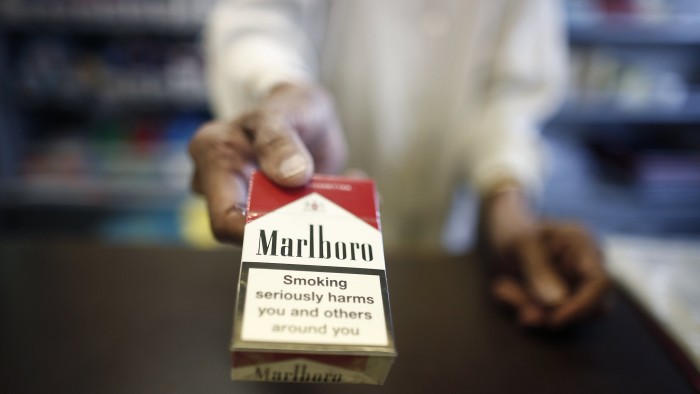Philip Morris shifts sales to new tobacco products

Simply sign up to the US & Canadian companies myFT Digest -- delivered directly to your inbox.
Philip Morris International’s cigarette sales in Japan have fallen by a quarter in a year as smokers switched to “heat not burn” sticks, making it one of the starkest examples of the shift to supposedly safer tobacco products.
In second-quarter results on Thursday, Philip Morris missed profit forecasts given falling demand for traditional cigarettes. Net income dipped 0.4 per cent to $1.78bn, or $1.14 a share, missing Wall Street forecasts of a rise to $1.9bn, or $1.22 a share. Shares dropped on the news.
Second-quarter results showed a 4 per cent rise in revenue to $6.9bn, or 7 per cent at constant currencies, with falling cigarette sales partially offset by “reduced risk” products and price rises.
Shipments of traditional cigarettes fell more than 7 per cent, following an 11.5 per cent decline in the first quarter of 2017, while shipments of alternative “heated units” rose to 6.4bn from 1.2bn in the same quarter last year.
During the quarter, almost 9 per cent of Philip Morris’s worldwide revenues came from “reduced risk products”, compared with 1.8 per cent a year earlier, with much of this shift occurring in Japan.
The biggest listed tobacco company, which makes Marlboro and L&M cigarettes, said on Thursday that cigarette volumes in Japan fell 25 per cent to 8.3bn in the second quarter of 2017 compared with a year earlier.
Sales of the Marlboro-branded tobacco sticks that smokers insert into Philip Morris’s iQos device rose more than five times to 5.7bn units. That means that sales of the tobacco sticks more than outweighed the fall in cigarette sales — the combined figure rose 15 per cent to 14bn units.
Japan has emerged as a key battleground between major tobacco companies that have developed technology as an alternative to conventional cigarettes that still tastes like one, but which the companies say is less harmful. Ecigarettes, which heat a nicotine-laced fluid into a vapour, are banned in Japan.
Last month, Peter Nixon, Philip Morris’s UK chief, said that “products like iQos are the absolute game changer” because smokers who tried it were much more likely to switch, compared with ecigarettes. “One day we want to stop selling cigarettes,” he said.
Philip Morris’s iQos device avoids burning tobacco, which it says is what produces the harmful substances that eventually kill many smokers. Instead it heats the tobacco to a temperature high enough to produce a nicotine-laced vapour that tastes like tobacco, but not high enough to burn it.
Comments